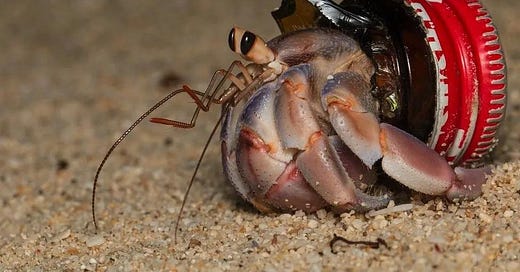The horror show that is plastic pollution in the ocean has become a cliche, but still unresolved, ocean conservation issue. And yet, the problem isn’t going away anytime soon - not while we continue to produce plastic and rely heavily on cleanup models to solve a pollution crisis of this scale.
We know well enough the health and environmental impacts of plastic, but a recent study conducted by scientists from the University of Warsaw is further proof of how deeply ingrained it is in the natural world.
Based on an analysis of photos taken by wildlife photographers and enthusiasts, scientists found that two-thirds of all terrestrial hermit crabs have started using plastic waste –in place of shells– as body armour. Gone are the beautiful spiral shells that once adorned the bodies of these little crabs, and in have come the much easier to obtain bottle caps, detergent lids, pieces of a lightbulb, tin cans, and any other marine plastic debris washed up into the path of an oblivious hermit crab.
The study calculated that 10 out of the approximately 16 species of terrestrial hermit crab had taken to using mainly plastic caps as a substitute for new armour and as all tropical regions where these species exist displayed the same pattern, scientists declared it a ‘global phenomenon’. The artificial shells were identified on 386 individual hermit crabs using only internet-based photographic evidence1 so further research is needed to uncover the real number and to identify exactly how this might be affecting the hermit crab.
For now, we can only guess at the why. The study listed sexual signalling, lightness of artificial shells, odour cues, and camouflage in a polluted environment as the potential drivers for hermit crabs to start depending on plastic waste in this way. The accessibility of the material probably helps too as there are at least 171 trillion pieces of plastic discarded in our ocean and natural snail shells are in decline. Current research also suggests these lighter, plastic materials might benefit weaker hermit crabs to survive for longer as they’re much easier to carry.
Urban ecologist, Professor Marta Szulkin, painted an interesting picture when she commented: “I think we really need to understand the fact that we are living in a different era and animals are making use of what is available to them.”
Is that not what makes this so harrowing? Plastic is the most prevalent form of marine waste, with already proven devastating consequences to wildlife. So how this uptake might impact the hermit crab is great cause for concern.
Invented just a century ago, plastic now threatens to become a disturbing norm within nature. Our inadequate cleanup efforts and current failure to implement alternative sustainable materials could confirm our legacy as ecological disrupters. This is a pivotal moment to ask ourselves how we2 reconcile a world where plastic has become both a poison, but also a home for some species.






We hold out hope that the 175 nations who committed to forging a Global Plastics Treaty by 2024 will agree on a resolution that is fair, focused and legally binding.
Here at Beached we are building a community that can put our brains and resources together to highlight and fund solutions to the problems facing the hermit crab and the oceans they live in. I hope you’ll join our humble community and click subscribe for free or support our work by purchasing the paid subscription.
All Beached posts are free to read but if you can we ask you to support our work through a paid subscription. These directly support the work of Beached and allow us to engage in more conversations with experts in the field of marine conservation and spend more time researching a wider breadth of topics for the newsletters. Paid subscriptions allow us to dedicate more time and effort to creating a community and provide the space for stakeholders to come together, stay abreast of each other’s work and foster improved collaboration and coordination.
One day Beached hope to donate a large percentage of the revenue from paid subscriptions to marine conservation organisations and charities to support their work too. Working together, we can reverse the degradation of our oceans.
Amie 🐋
This is actually a form of iEcology, or internet ecology, whereby online data is used as a new tool in ecological research.
I am by no means suggesting that the responsibility falls on individuals but there is room for improvement at a consumer level.






Great post! Keep ‘em coming!